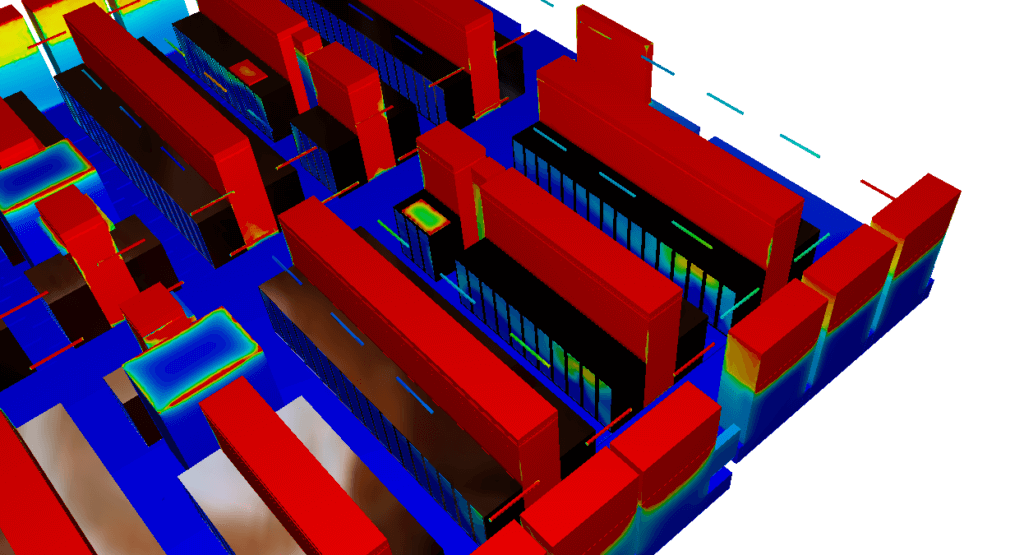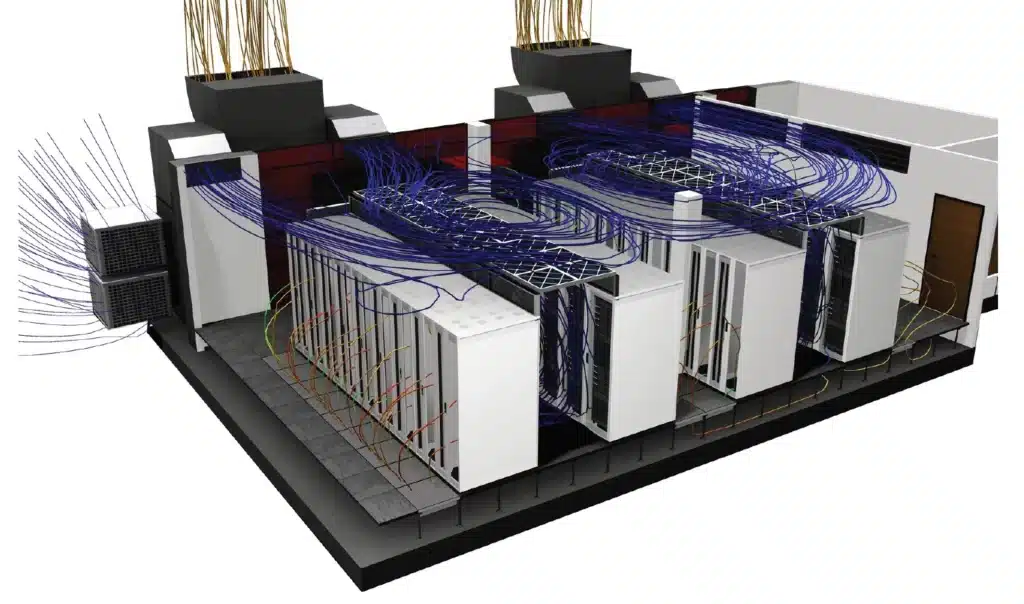Climate engineering of data centers
Accueil » Expertise » Data center » Climate engineering of data centers
EOLIOS takes care of your data center with CFD simulation
- Urbanization of hot and cold aisles
- Validation of the maximum air temperature at the equipment inlet
- Recommendation on chilled water temperatures
- Study of critical failure scenarios
- Identification of bypass and recirculation air flows
- Improved air distribution and cooling efficiency
- Precise dimensioning of the grid layout
- Optimization of the placement and control of air handling systems
- Study of the set points of the air treatment systems.
Continue browsing :
Our latest news:
Our projects :
Our fields of intervention :
What use of CFD simulation for data centers?
The
CFD modeling
is generally used at the design stage for the analysis of the dimensioning of the installations. Computer simulation provides information on the relationship between the operation of air conditioning systems and variations in the thermal load of IT equipment. With this information, IT and site personnel can optimize airflow efficiency and maximize cooling capacity.
Many different types of equipment and systems are installed in data centers and server rooms. An abundance of subsystems, such as rows of storage area network equipment, network switching equipment, or high-density servers, translates into an abundance of heat sources and cooling systems. Therefore, it is very difficult to understand how these different systems coexist, affecting air distribution and pressure in a room.
Our computer modeling methods, and in particular the computational fluid dynamics (CFD) tools, allow us to analyze these options in detail and to graphically represent the temperature distribution, the propagation speed of the flows and the atmospheric pressure in the different spaces
CFD modeling is not a simple solution to a problem, but a pragmatic application that can help optimize the overall understanding of the project or explore how it is possible to reduce the operating costs of an existing facility. On the other hand, it makes it possible to validate by simulation the climatic dimensioning of a room made up of high density servers in an extreme scenario .
The following are the benefits that can be obtained from using CFD modeling in the design of a server room, or in the analysis of a working data center.
- Test hypotheses on the operation of cooling systems (CRAH) in the server room
- Crisis Management - Will the design backup air conditioners carry the load if one of the main air conditioners fails?
- The company plans to virtualize applications; what happens if you add a new density array?
- Will the data center run more efficiently if the IT equipment is placed differently?
- Will the data center run more efficiently if the cooling system is changed?
- What happens if the temperature of the air entering the computer equipment increases?
- What happens if the temperature of the chilled water supplied to the CRAH is increased?
- Is my system just viable?
Our integrated study approach
When an EOLIOS engineer with expertise in data center design works with your team, they can solve your data center design problems. On the other hand, our mastery of the climate management of this type of space guarantees the customer a guarantee of results and the elimination of any disorders.
More importantly, by simulating crisis scenarios the unknown variables and the consequences of problems (supplier power cut) can be avoided from the outset.
By using CFD modeling in the design, power and cooling systems can be optimized prior to facility construction and before investing in a project. CFD modeling allows site personnel and IT staff to validate the functionality of the systems in all crisis situations, thusavoiding the risk of malfunctioning during use.
We study safety equipment restart scenarios, loop inertia and temperature rise to calculate maximum temperatures at all points in the space and define the most unfavorable IT servers.
Why perform a CFD simulation of a data center?
The initial investment in CFD modeling pays off many times over. The CFD model allows simple 3D images that are easy to understand by all project stakeholders, which can be analyzed by considering both static images and dynamic videos.
If necessary, the information is protected, because our files can only be played on media players for which a special driver provided by EOLIOS is installed. These 3D color-coded server room maps, showing heat distribution, air velocity and pressure in the space, canindicate areas that need to be refined or simply redesigned. We generally optimize the design of the positioning of the grids on the ground so as to provide a homogeneous flow for all the servers.
“The airflow of a false floor grille can vary by more than 50% depending on its positioning, the room configuration and its distance from the air conditioning systems.
Conclusions and recommendations can be made based on the information from the transient scenarios to provide a safe and reliable operating environment for your IT investment. Thus, CFD modeling services within EOLIOS are a great added value for investors and integrators, as well as for end-users, who get a clear picture of the risks their data center is facing.
Internal simulation - Data center
Why perform an external CFD simulation of a data center?
Define the power losses in extreme conditions
Data centers are sites where the density of calorie extraction is very high. The pooling of systems, the superposition of server halls, the continuous increase in power of the server racks leads to extremely high heat dissipation on the roof. The dissipation surface being constrained by the dimensions of the building, this results in a very high concentration of air conditioning systems on the roof, leading to a significant risk of power losses, or even cascading systems failing during extreme climatic conditions.
In very strong heat, or during power failure scenarios on the site, superheated air plumes generated by the cooling systems can generate a sharp drop in cooling power, see a a cascade shutdown of systems of roof leading to a generalized fault of the site.
Outdoor CFD studies for data centers enable us to study the risk of power loss and optimize the layout of rooftop cooling systems.
Study of the pollution risks of the premises
At the same time, it is possible to verify that the fumes (Nox) from the generators are not taken up by the air handling units on the roof, which would lead to air pollution in the offices.




